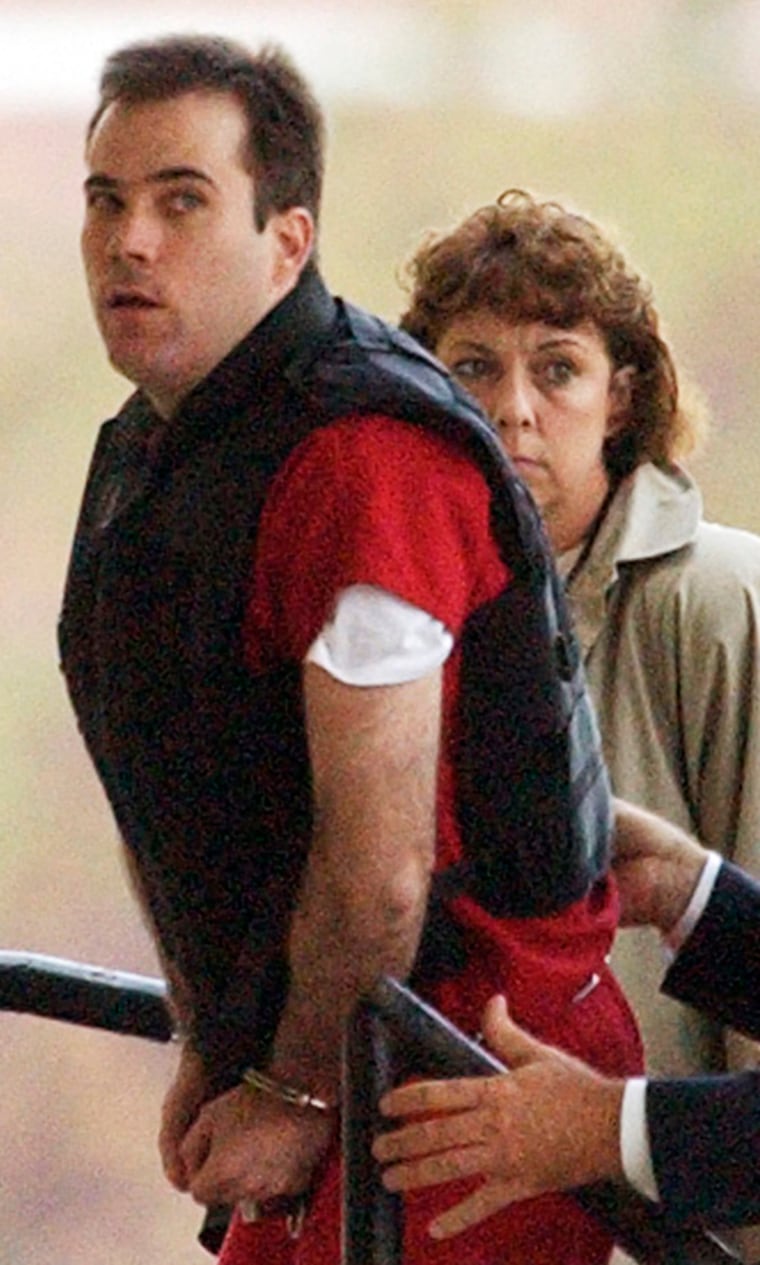Eric Rudolph has agreed to plead guilty to carrying out the deadly bombing at the 1996 Atlanta Olympics and setting off three other blasts in a deal that allows the anti-government extremist to escape the death penalty, the Justice Department said Friday.
“The many victims of Eric Rudolph’s terrorist attacks ... can rest assured that Rudolph will spend the rest of his life behind bars,” Attorney General Alberto Gonzales said in a statement from Washington.
Rudolph, 38, is scheduled to admit his guilt Wednesday in court. The plea deal calls for four consecutive life sentences without the possibility of parole. Rudolph had faced a possible death sentence.
As part of the deal, Rudolph provided authorities with the location of more than 250 pounds of dynamite buried in the mountains of North Carolina. Family members of bombing victims said they were angry that Rudolph will not get the death penalty but said they grudgingly went along with the deal in part to protect others from the explosives.
Defense lawyer Bill Bowen did not immediately return a call seeking comment.
Rudolph, thought to be a follower of a white supremacist religion that is anti-abortion, anti-gay and anti-Semitic, was charged with carrying out a series of blasts in Georgia and Alabama in the late 1990s that killed two people and injured more than 120.
Escape into the mountains
One woman was killed and more than 100 people were injured in the Olympic blast, caused by a bomb in a knapsack that sent nails and screws ripping through a packed crowd that had gathered to watch a rock concert. In the next two years, he allegedly set off bombs at a lesbian nightclub in Atlanta and at two abortion clinics — one in Birmingham and one in Atlanta. The Birmingham attack killed an off-duty police officer and maimed a nurse.
Rudolph then slipped away into the mountains of western North Carolina, where the former soldier used survivalist techniques to live off the land for more than five years — all while being on the FBI’s list of 10 Most Wanted fugitives. Then in May 2003 he was captured after being seen scavenging for food near a grocery store trash bin in Murphy, N.C.
Linda Bourgeois, administrator at the Birmingham abortion clinic, said a couple of employees “jumped up and down and screamed” in excitement over the news of the plea deal. “We think it’s a victory for all women everywhere,” she said.
But Jeff Lyons, whose wife was left blind in one eye in the Alabama bombing, said he and his wife were “extremely disappointed” in the life sentences. “As they say, let the punishment fit the crime. That was a death sentence,” he said.
Plea bargain allows discovery of explosives
Lyons said he understood prosecutors’ reasons for agreeing to a plea deal since Rudolph directed them to explosives — something that likely would not have happened had the case gone to trial. The government said some of the explosives were found “relatively near populated areas.”

The hidden explosives included a fully constructed bomb with a detonator; the Justice Department said the explosives were located and safely disposed of.
The husband and daughter of Alice Hawthorne of Albany, Ga., who was killed in the Olympics bombing, said they reluctantly went along with the deal to make sure others don’t get hurt.
Husband John Hawthorne and daughter Fallon Stubbs said in a statement that they “would not want their unwillingness to support a plea bargain to result in the loss of life and/or serious injury to unsuspecting citizens who may come across the explosives.”
Rudolph became an almost mythic figure to some residents of western North Carolina during a manhunt across 550,000 acres of Appalachian wilderness that at one time involved 200 agents. Many mocked the government’s inability to root him out. He inspired two country-western songs and a top-selling T-shirt that bore the words “Run Rudolph Run.” A $1 million reward offer from the government went unclaimed.
‘Caged for the rest of his life’
Investigators suspect that sympathizers in the countryside may have assisted Rudolph during his time on the run.
Charles Stone, a retired Georgia Bureau of Investigation agent who helped oversee the Rudolph bombing probe, said a life sentence may be a more fitting punishment for a man who thrived in the outdoors.
“He’ll be caged for the rest of his life, and from a retribution aspect, that’s probably worse than a death sentence for him,” Stone said.
After the Olympic bombing, The Atlanta Journal-Constitution reported that security guard Richard Jewell was being investigated in the bombing. But he was cleared by the FBI three months later and eventually filed a civil lawsuit against the newspaper that is still pending.
Final vindication
Jewell’s attorney said Friday that the plea deal should be a final vindication. “One does not have to speculate a great deal to imagine how he will feel when he does receive this final and total vindication,” attorney L. Lin Wood said.
Justice Department officials chose the Birmingham bombing as the one to try first, and then-Attorney General John Ashcroft decided to seek the death penalty if Rudolph was convicted. Right after Rudolph’s capture, Ashcroft predicted the Alabama trial would be “relatively short and straightforward.”
Jury selection in the Birmingham bombing case began this week.